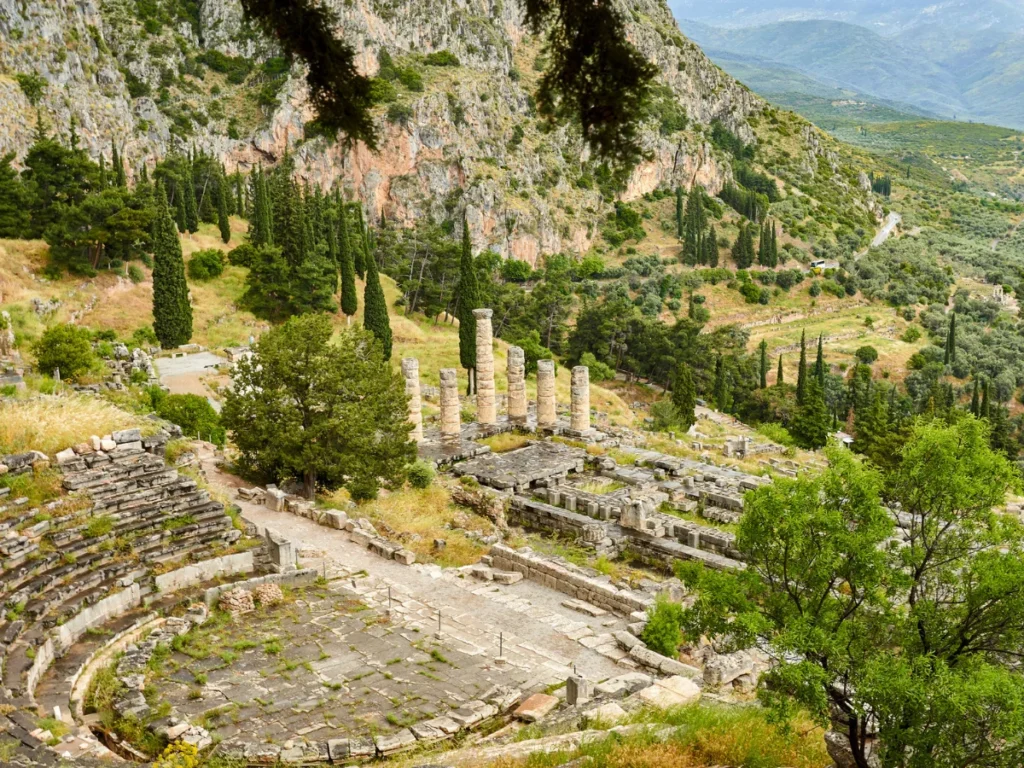Ancient greek gods
The ancient Greek gods, with their divine personalities and intricate relationships, served as mirrors reflecting the multifaceted nature of human existence. Ancient Greek religion was a vibrant tapestry interwoven with gods embodying various aspects of life. These deities, from powerful Zeus to wise Athena, influenced daily affairs and guided beliefs. Sacred sites like Delphi, Acropolis, and Olympia marked connections between mortals and gods.

Ancient greek religion and religious sites
Ancient Greek religion was a tapestry of beliefs, rituals, and interactions with a pantheon of gods and goddesses. One of the most revered religious sites was Delphi, nestled on the slopes of Mount Parnassus. Here, the Oracle of Delphi channeled Apollo’s divine wisdom, offering cryptic prophecies that guided decisions from personal to political.
Additionally, the Acropolis in Athens stood as a monumental religious hub. Crowned by the Parthenon, it was dedicated to Athena, the city’s patron goddess. Festivals like the Panathenaic Games celebrated her and showcased athletic prowess.
Similarly, Olympia hosted the Olympic Games, a testament to religious devotion, physical prowess, and unity among Greek city-states. The Heraion temple here honored Hera, wife of Zeus, underlining the religious significance of athletic events.
At Epidaurus, the healing god Asclepius reigned, and his sanctuary attracted those seeking divine remedies. Temples adorned with offerings stood as bridges between mortals and the divine.
Meanwhile, the island of Delos was birthplace to Artemis and Apollo. Its sanctuaries celebrated these twin deities with annual festivals and offerings.
In Corinth, the Temple of Apollo showcased the god’s connection to trade, wealth, and prophetic powers. The Isthmian Games held there honored Poseidon, emphasizing his domain over the seas.
In conclusion, Greek religious practices were woven into the fabric of daily life, with revered sites like Delphi, the Acropolis, Olympia, and more, serving as conduits to the divine. These places were not merely physical spaces but bridges connecting mortals to the realm of gods and goddesses.
The ancient greek gods
Zeus:
As the king of the gods, Zeus commanded the heavens and Earth. His thunderbolt symbolized his power, and his wisdom guided divine affairs.
Hera:
The queen of the gods, Hera, embodied marriage and family. Her watchful eye guarded fidelity, yet her temper ignited storms when crossed.
Poseidon:
The god of the sea and earthquakes, Poseidon held dominion over watery realms. His trident controlled oceans and tempests, reflecting his volatile yet commanding nature.
Athena:
Born from Zeus’ head, Athena was the goddess of wisdom, strategy, and warfare. Her patronage extended to crafts and arts, embodying intellect and courage.
Apollo:
The sun god, Apollo, radiated artistic and intellectual brilliance. Archery, music, and healing were his domains, epitomizing both creative and curative talents.
Artemis:
Apollo’s twin sister, Artemis, personified the wilderness and hunting. As the protector of nature and women, she exuded independence and ferocity.
Ares:
The god of war, Ares reveled in combat’s chaos. His valor, however, was marred by his impulsive and violent demeanor.
Aphrodite:
The goddess of love and beauty, Aphrodite’s allure captivated both gods and mortals. Her influence spanned passion, desire, and affection.
Hermes:
As a messenger and herald of the gods, Hermes facilitated communication between divine realms. His swiftness and cunning were balanced by his wit.
Hephaestus:
The blacksmith god, Hephaestus forged divine weaponry and crafted intricate works. Despite his physical deformity, his skills were celebrated.
Dionysus:
The god of wine and revelry, Dionysus embodied ecstasy and liberation. His festivals celebrated hedonism, fostering uninhibited joy and madness.
Demeter:
The goddess of agriculture, Demeter nurtured the earth’s fertility. Her grief for her daughter Persephone brought forth the changing seasons.
Hestia:
The hearth goddess, Hestia represented home and hearthfire. Her gentle presence enveloped domestic warmth and familial unity.
In the pantheon of ancient Greek gods, each deity held unique attributes and symbolism, collectively shaping the intricate fabric of myth and belief.
